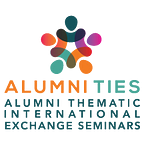Creating Regenerative Pathways toward Healthy, Equitable, and Sustainable Communities
With a mountainous backdrop, wide terrain, and high altitude, 34 ExchangeAlumni gathered in the heart of the “mile high” city of Denver, Colorado. The participants, who represented 19 states and the District of Columbia and 20 exchange programs, met in April at the Alumni TIES on “Environmental Diplomacy and its Impact on American Society.” ExchangeAlumni who are studying and working in renewable energy, environmental justice, climate change adaptation and mitigation, green infrastructure, and environmental conservation came together. During the week, they explored the economics of environmentalism and discussed integrative and inclusive measures for regenerative environmental practices that can create new economic opportunities for their local communities.
Assistant Secretary of State Lee Satterfield greeted the Alumni TIES participants in a warm welcome video, thanking them for their work in helping to mitigate the climate crisis. Following this inspiring start, Lily Bermel, Special Assistant for the Office of Global Change at the U.S. Department of State, led the first session virtually as she debriefed the cohort on the outcomes of the 26th annual United Nations Climate Change Conference (COP26). COP26 took place in Glasgow, Scotland in October and November 2021, resulting in the Glasgow Climate Pact that presents a plan to reduce unabated coal usage among the 197 attending parties. Ms. Bermel’s presentation resonated with participants, who brought that energy to their first participant-led panel discussion on “Examining the Impact of Climate Change on Underserved and Minority Communities.” Panelists addressed how and why climate change disproportionately affects specific communities in the United States and developed comprehensive strategies for how to promote inclusive, regenerative environmental justice. These important conversations continued throughout the week, as participants dove into the complexities of environmental topics as varied as youth environmental education and outreach programs, sustainable living and practices, improving access and reducing risks for environmental equity, and tangible tools and resources for building healthier communities.
speaks to Alumni TIES participants
In addition to learning from one another’s expertise during the week, outside experts in the field taught ExchangeAlumni about environmental initiatives and community strategies — both virtually and in-person. Participants met virtually with the National Renewable Energy Laboratory (NREL), who shared how they are transforming energy through research, development, commercialization, and deployment of renewable energy and energy efficiency technologies. The NREL team took the group on two virtual tours of their “Energy Systems Integration” and “Cold Climate Housing Research Authority” initiatives. Participants also met with local Denver organizations — Spirit of the Sun, Blue Star Recyclers, and the Colorado Energy Office — where they learned first-hand how these organizations are actively engaging their communities to promote environmentally sustainable living. Spirit of the Sun discussed the history of Denver’s Indigenous peoples and the organization’s mission to help youth in the Indigenous community reconnect themselves with the Earth and build needed skills in planting, pollinating, and nurturing crops. At Blue Star Recyclers, a group of ExchangeAlumni toured the recycling facilities and witnessed how this organization is efficiently combining support for those on the autism spectrum with their mission to recycle tons of electronic waste changing e-waste into increased job opportunities. During the meeting with the Colorado Energy Office, participants met with the policy advisor to learn about Colorado’s roadmap to 100% renewable energy by 2040, their climate listening tours (needs assessments of rural communities), home weatherization program, and their outreach programs in increasing the use of electric vehicles.
During the seminar, participants had several opportunities to collaborate as they designed community-based projects to address the urgency of climate change’s negative impacts on their local communities. Following every Alumni TIES seminar, participants are eligible to apply for a grant of up to $10,000 to implement a community project related to the seminar theme. By the final day, many had shared their desire to maximize their new knowledge and skills developed at the seminar and use the grant to create sustainable change in their communities.
Through the intense discussions and debates, laughter, and non-stop conversations, it was evident that the bond between this cohort would last beyond the seminar. In each session, participants were intentional and respectful with one another not only in how they shared information but also in how they received it. These changemakers left with a rooted understanding of the need for socially regenerative innovation in their communities and the importance of “working from where you are to build hope.” The Alumni TIES team left confident that the relationships that the ExchangeAlumni built that week would only continue to flourish and grow.
The Alumni Thematic International Exchange Seminars (Alumni TIES) program is funded by the U.S. Department of State and administered by World Learning and State’s Office of Alumni Affairs, in the Bureau of Educational and Cultural Affairs (ECA).
